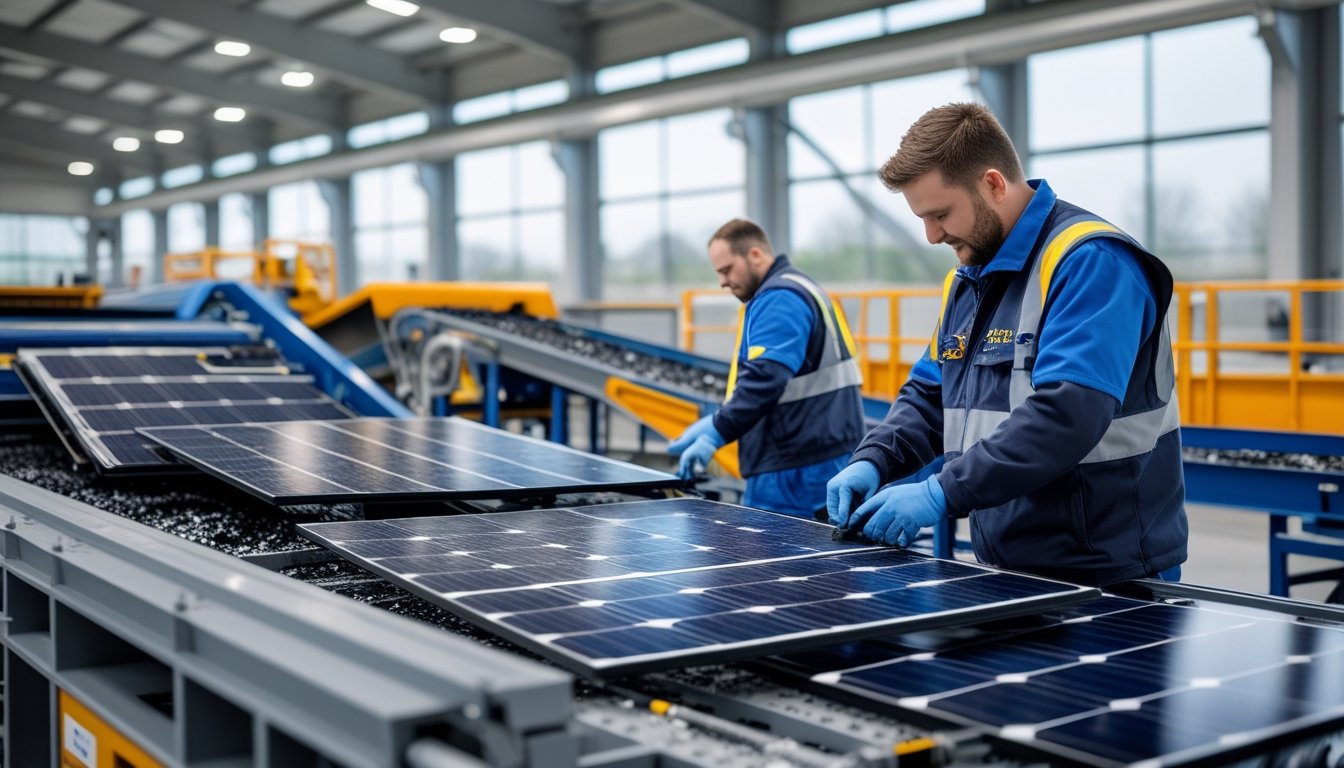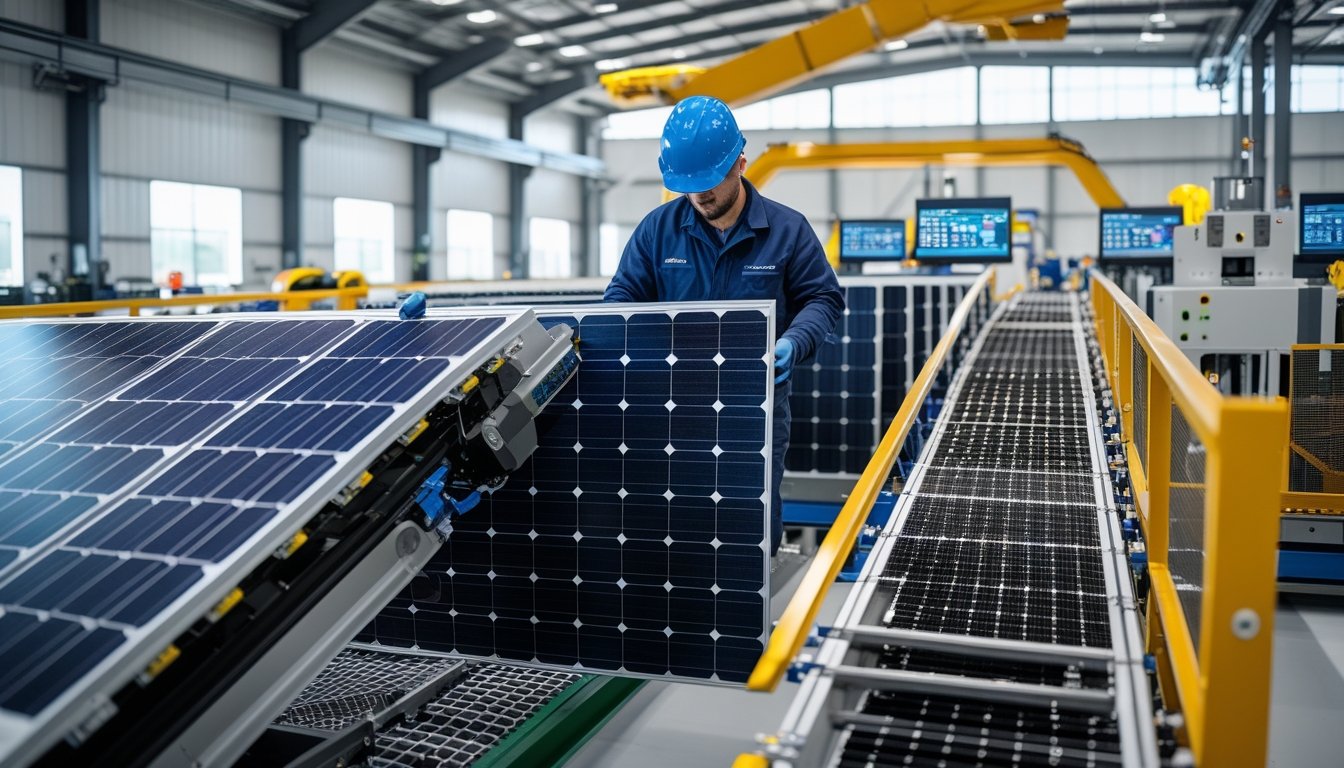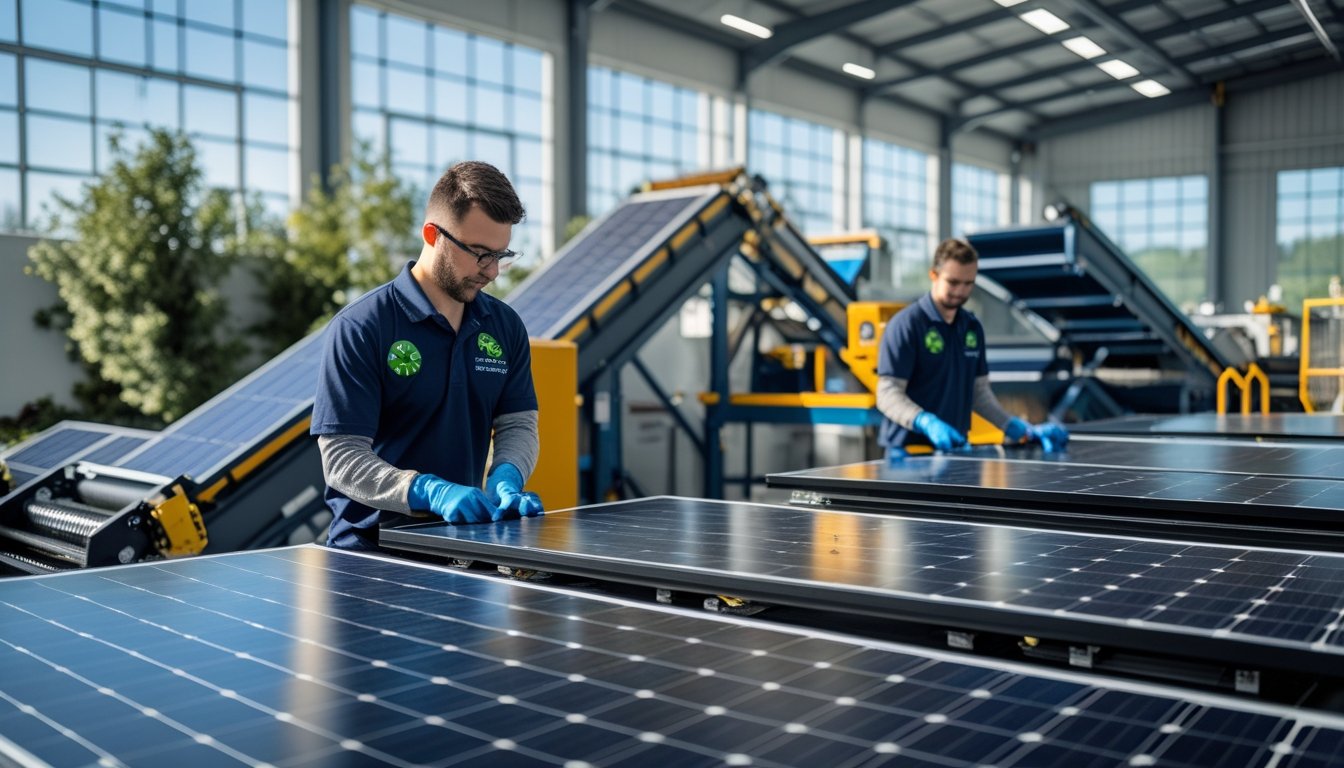Late updated: 28 May 2025 09:05
Written by: Eleanor Hartman
Innovative Solar Panel Recycling Solutions in the UK: Advancing Sustainable Practices
Harnessing renewable energy from solar panels is an essential step towards sustainability. Yet, as solar installations age and reach the end of their service life, dealing with solar waste is becoming increasingly important. In the UK, innovative solutions for solar panel recycling are crucial for ensuring that these valuable resources are efficiently reused and do not contribute to environmental pollution.

Our exploration of solar panel recycling has shown that multiple UK companies are pioneering in this field by offering comprehensive and eco-friendly recycling services. Notably, Solar Recycling Solutions (SRS), established in 2024, stands out as the UK's first organisation dedicated to the complete deconstruction and recycling of solar panels. They break down panels into reusable materials, embodying a commitment to environmental responsibility that is essential for future progress.
As more partnerships form and recycling technologies advance, the landscape of solar panel waste management continues to evolve rapidly. These advancements not only mitigate industrial waste but also reclaim valuable materials, supporting both the renewable energy sector and broader sustainability goals. This journey into the realm of solar panel recycling offers insight into the intricate processes and innovations reshaping our approach to renewable energy.
Key Takeaways
- Solar panel recycling is essential for sustainability in the UK.
- Innovative solutions are led by companies like SRS from 2024 onwards.
- Advancements aid waste management and support renewable resources.
Overview of Solar Panel Recycling in the UK
Solar panel recycling in the UK is gaining significance, driven by environmental concerns and regulatory requirements. Our focus is on understanding the current recycling infrastructure, the legal framework surrounding it, and the materials involved in solar panel composition and recovery.
Current UK Recycling Infrastructure
The UK has been increasing its capacity for recycling solar panels with establishments like Solar Recycling Solutions (SRS), which launched in 2024. SRS is notable as it offers a comprehensive service for decommissioned solar panels. There is a growing network of facilities dedicated to recycling electronic waste, which includes solar panels.
Local councils and private companies manage these waste collections and recycling operations, guided by environmental priorities. Successfully recovering valuable materials from solar panels is part of fostering a sustainable energy sector. Importantly, the infrastructure here is still in its developmental stages, with ongoing efforts to expand and refine processes.
Legal Obligations and Regulatory Framework
The UK has established legal structures like the Waste Electrical and Electronic Equipment (WEEE) Directive to manage the disposal and recycling of solar panels. This directive mandates producers to finance the collection, treatment, and disposal of electronic waste. Meeting these legal obligations ensures manufacturers and recyclers contribute to environmental protection.
Compliance with these rules is pivotal for any firm involved in solar panel recycling. In addition to the WEEE Directive, various environmental standards must be met to minimise the negative impacts associated with waste disposal. Adherence to regulations is not just a legal compulsion but a social responsibility for the energy sector.
Solar Panel Composition and Material Recovery
Solar panels are made from various materials, including glass, aluminium, silicon, and sometimes cadmium telluride. Recovering these materials prevents them from ending up in landfills, where they could cause environmental harm. The composition of solar panels necessitates advanced recycling methods to efficiently extract these substances.
Material recovery focuses on creating a circular economy by reclaiming glass and metals for reuse. Innovations in closed-loop recycling processes are crucial as they allow us to recycle and reuse these components in new panels. By understanding the composition and applying effective recovery techniques, we aim to reduce the environmental footprint and enhance sustainability.
Innovative Solutions and Technological Advancements

Our journey through solar panel recycling has revealed several breakthroughs in technology and sustainability. Innovative methods and advanced machinery are shaping the recycling process, aligning with environmental goals while supporting the circular economy. This section explores these advancements in detail.
Cutting-Edge Recycling Technologies
Innovative recycling solutions in the solar panel sector have made remarkable strides recently. New technologies focus on efficient material recovery from end-of-life solar panels. We've seen systems like thermal treatment and mechanical separation that aim to retrieve valuable materials like glass and silicon.
These technologies reduce waste and improve the economic viability of solar panel recycling. By focusing on fine-tuning these processes, we can achieve more sustainable solutions that complement the growth in the renewable energy market.
Advanced Machinery in Material Separation
Material separation is a critical phase in solar panel recycling. Advanced machinery plays a vital role here, incorporating sophisticated techniques to separate components such as silicon and valuable metals from the panels. Robotic automation and precision sorting technologies are currently at the forefront of these efforts.
These machines are being developed and refined to process large volumes efficiently, reducing both cost and time. Such advancements enhance the recycling facilities' capabilities, making them more integral to achieving the ambitious environmental goals set for the solar energy industry.
Sustainable Practices and the Circular Economy
The adoption of sustainable practices is crucial to driving the circular economy within solar panel recycling. By designing recycling processes that prioritise the recovery and reuse of materials, we are moving towards a system that minimises waste and maximises resource utilisation.
This approach not only supports our environmental objectives but also strengthens the solar panel recycling market. Promoting a lifecycle where materials constantly re-enter the production stream ensures a reduction in "early loss" and supports long-term sustainability. Emphasising these practices is essential in realising a truly sustainable renewable energy future.
Frequently Asked Questions

In the UK, solar panel recycling has seen innovative advancements with a focus on sustainability. We've gathered essential questions and answers regarding new technologies, cost factors, and the logistics involved in recycling solar panels.
What are the latest advancements in solar panel recycling technology in the UK?
Recycling technology in the UK now includes more efficient separation processes and improved materials recovery solutions, enhancing the sustainability of solar panel reuse.
How cost-effective are solar panel recycling methods in the United Kingdom?
Solar panel recycling in the UK is becoming more cost-effective thanks to governmental and industrial support, which often enables free recycling for consumers.
Where can one find solar panel recycling facilities in the UK?
Facilities can be found across the UK, with many installers offering take-back schemes as part of their service. These schemes ensure panels are sent to certified recycling centres.
What is the process involved in recycling solar panels in the UK?
The recycling process generally includes the dismantling of panels, separation of materials like glass and silicon, and the recovery of valuable components.
How does the PV CYCLE programme contribute to solar panel recycling in the UK?
The PV CYCLE programme plays a critical role by offering comprehensive services for the collection, transport, and recycling of photovoltaic waste across the UK.
What are the typical costs associated with disposing of solar panels in the United Kingdom?
Typically, consumers in the UK incur no costs for recycling solar panels due to established take-back schemes by installers and supporting regulations.